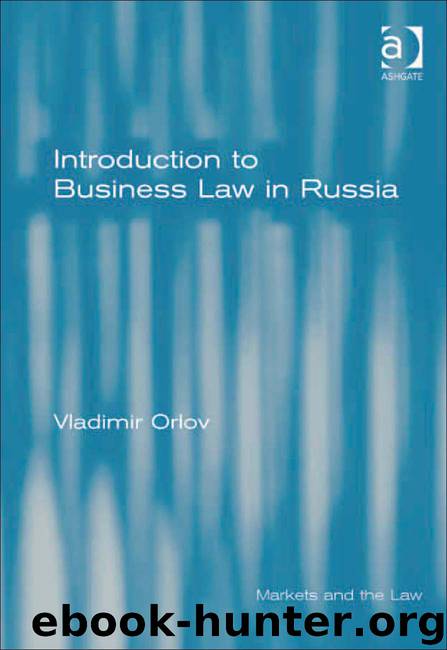Introduction to Business Law in Russia by Vladimir Orlov

Author:Vladimir Orlov
Language: eng
Format: epub
Publisher: Ashgate Publishing Limited
Published: 2011-10-23T04:00:00+00:00
Representation and Authorization107
Concept of representation Civil law subjects may execute their civil law rights and duties in Russia, as elsewhere, not only personally but also through their representatives. It is common that obligation law rights are exercised by using representatives. However, personal non-obligation law rights—for instance, the application for a patent for an invention—may also be executed through a representative. Transactions, included contracts, are mainly concluded by using representatives. In certain cases it is, however, impossible owing to the stipulation of the law or because of the nature of the rights or duties, in which case the civil law subject must act himself. Such transactions include, for instance, the will and issuance of power of attorney. The rules regulating representation, including power of attorney, are contained mainly in the norms of the Civil Code directly devoted to them (Articles 182–9) as well as in the rules of the Civil Code concerning physical persons (Articles 28 and 29) and certain juristic persons and their representations and branches (Articles 55, 72, and 84) as well as invalidity of transactions (Articles 174 and 179). The rules on power of attorney are also included in the type of contracts norms of the Civil Code regulating delegation (Articles 974 and 975), freight forwarding (Article 802), and simple partnership (Article 1044).
According to the rules on representation and power of attorney in the Civil Code, in the event of representation a transaction concluded by one person (representative) in the name of another person (representee) by virtue of the power based on the power of attorney, on the stipulation of the law, or on an act issued by a state body or a local self-government body empowered thereto directly creates, changes, or terminates the civil rights and duties of the representee (Article 182.1).
Representation is recognized in Russian civil law as obligatory or voluntary or discretionary. Obligatory representation is grounded, according to the Civil Code, on the law (statutory representation), and is represented in the representation of a minor (Article 28) or incompetent minor or incompetent person (Article 29), or on the administrative act issued by an authorized state body or local self-government or some other body. The grounds for a voluntary representation or authority may be, in turn, a delegation contract (delegation authorization) or power of attorney (power of attorney authorization; Articles 185–9). As a modification of voluntary representation is regarded commercial representation in Russian law, and the rules on it are contained in a special norm of the Civil Code (Article 184). Specific to voluntary representation is that the representation powers of the representative are determined in accordance with the will of the representee.
In a representation relation there are three parties: the representee or principal, the representative and a third person. The specific feature of representation is that the necessary acts are made by the representative, whereas their results arise to the principle. Furthermore, representation concerns transactions or legally significant but not factual acts, wherefore the representative may act only if he has legal capacity as a physical or juristic person.
Download
This site does not store any files on its server. We only index and link to content provided by other sites. Please contact the content providers to delete copyright contents if any and email us, we'll remove relevant links or contents immediately.
The Pirates of Somalia by Jay Bahadur(1625)
Political Theology by Carl Schmitt(1577)
The Holocaust: A New History by Laurence Rees(1521)
The Social Animal by David Brooks(1452)
A Practical Guide to International Arbitration in London by Hilary Heilbron(1434)
Restitution by Restitution(1424)
Pirates of Somalia by Jay Bahadur(1381)
Coercing Virtue by Robert H. Bork(1357)
The Nuremberg Interviews by Leon Goldensohn(1304)
Basic International Corporate Taxation by Sebastiano Garufi(1214)
A History Of Thailand by Baker Chris(1190)
International Trade and Business: Law, Policy and Ethics by Gabriël Moens & Peter Gillies(1137)
The Global Commons by Susan J. Buck(1137)
The Sovereignty of Human Rights by Macklem Patrick(1113)
Blood Profits by Vanessa Neumann(1113)
Asian Waters by Humphrey Hawksley(1113)
Spring Fever: The Illusion of Islamic Democracy by McCarthy Andrew C(1102)
The Nuremberg Trials: The Nazis and their Crimes Against Humanity by Roland Paul(1043)
Crimes Against Humanity: Historical Evolution and Contemporary Application by M. Cherif Bassiouni(1027)
